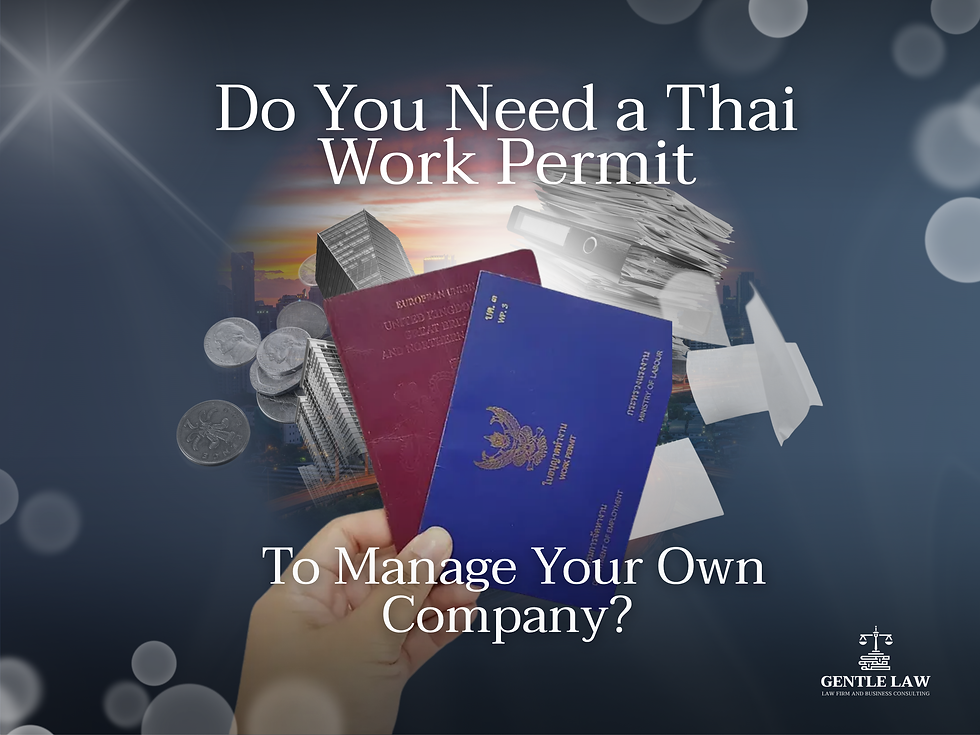Thailand Work Permit for Foreign SME Directors: What You Must Know
- gentlelawlawfirm
- Aug 26, 2025
- 3 min read
Updated: Sep 5, 2025
Many foreign entrepreneurs set up a Thai company and appoint themselves as managing directors. However, the title alone does not authorize you to work in Thailand. A valid work permit is required if you perform any work for your company. Thai law defines work broadly as exerting physical or mental effort for value. Therefore, foreigners must not work without a work permit.
This GENTLE LAW IBL guide explains the essentials for a foreign SME director regarding the Thailand work permit. We will cover when a work permit is required, typical capital and headcount conditions, visa links, BOI variations, and common risks.
Key Takeaways
A foreign director who performs management, signs contracts, or otherwise works for the company requires a work permit.
For non-BOI companies, you typically need paid-up capital of at least THB 2 million per foreign employee and a ratio of four Thai employees per foreigner, with some exceptions. Immigration offices publish these conditions for business visa extensions.
Some occupations remain prohibited to foreigners. Verify your planned duties do not fall within restricted lists.
Who Needs a Work Permit in Thailand?
Under the Emergency Decree on Managing the Work of Aliens B.E. 2560 (2017) and the 2018 amendment, foreigners must obtain a work permit before performing work in Thailand unless an exemption applies. Work includes physical or intellectual effort for value. Therefore, board-level or director activities that involve management or signing on behalf of the company count as work.
Foreigners and employers are prohibited from engaging in or accepting prohibited occupations as announced by the Ministry of Labour.
Thailand Work Permit for Foreign SME Directors - Typical Company Conditions
For a standard Thai limited company that is not BOI-promoted, immigration practice commonly requires the following for each foreign work permit or business visa extension:
Paid-up registered capital of at least THB 2,000,000.
At least one foreign employee for every four Thai employees.
Certain exceptions apply; for example, representative offices and branch offices may use a one-to-one ratio. Different thresholds can apply by location. Check your local immigration office’s published checklist.
These conditions are administrative practices tied to visa and work authorization processing. They sit alongside the work-permit obligation under the Decree. Always verify the current checklist at the immigration office with jurisdiction over your company.
Visa Link and Timing
A work permit is normally processed together with, or after, a Non-Immigrant B visa. You should enter Thailand with the correct Non-B status or convert your status before working. Local immigration offices publish the documentary and financial conditions for the Non-B extension, including capital and Thai-to-foreigner ratio.
Directors, Shareholders, and Exemptions
Passive shareholders who do not perform any work do not require a work permit.
Active directors who manage, supervise staff, sign contracts, or represent the company require a work permit. This flows from the Decree’s broad definition of work and the prohibition on working without a permit.
BOI-promoted companies follow BOI facilitation on visas and work permits. They often enjoy flexibility on capital or Thai employee ratios. However, directors must still hold work authorization if they work. Confirm BOI terms before relying on them.
Compliance Risks and Common Mistakes
| Risk | Why It Matters | How to Fix |
|-------------------------------------------|-----------------------------------------------------|------------------------------------------------------------|
| Assuming a director title is enough | The Decree requires a permit to perform work | Secure the correct Non-B visa, then the work permit before starting work. |
| Under-capitalizing or lacking Thai staff | Local immigration offices check capital and ratios | Increase paid-up capital and recruit eligible Thai employees to match the published checklist. |
| Performing restricted work | Some occupations are prohibited to foreigners | Map your duties against the current prohibited list from MOL. |
| Letting visa and work permit fall out of sync | You must maintain both statuses | Track renewal dates and keep payroll, tax, and social security records aligned with your authorizations. |
Step-by-Step for Foreign SME Directors
Pre-check: Confirm your duties are not on the prohibited list and that your company can meet capital and headcount thresholds.
Prepare documents: Gather the company affidavit, paid-up capital proof, Thai staff list, lease, revenue and social security records, and your role description aligned with actual duties. Follow the current immigration office checklist for Non-B and extension.
Apply for Non-B and work permit: The sequence varies by location, but you will typically obtain or extend the Non-B visa and submit the work permit application in parallel.
Post-approval compliance: Keep payroll and tax filings consistent with permit details. Changes to position, location, or employer require amendment.
How GENTLE LAW IBL Helps Directors
Company structuring that aligns with Thai capital and staffing practices.
Non-B visa and work permit planning and filings.
BOI pathway assessment where applicable.
Compliance training for management and HR on what counts as work under the Decree.
Ready to lead your company the right way? Contact GENTLE LAW IBL for a work permit readiness review and end-to-end filings.



